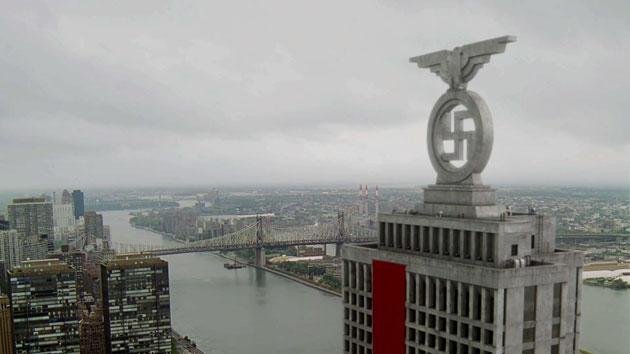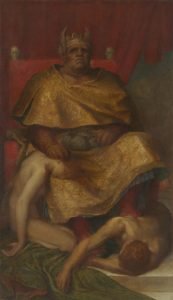The Man in the High Castle: The Consequences of Alternate History
The Man in the High Castle is a groundbreaking television series that explores the consequences of alternate history. Based on a novel by Philip K. Dick, the show imagines a world where the Axis Powers won World War II and divided up the United States. The show’s success is due in part to its ability to bring this alternate history to life on screen. In this article, we’ll take a closer look at how The Man in the High Castle uses alternate history to create a cinematic triumph.
The Man in the High Castle is a groundbreaking television series that explores the consequences of alternate history. Based on a novel by Philip K. Dick, the show imagines a world where the Axis Powers won World War II and divided up the United States. The show’s success is due in part to its ability to bring this alternate history to life on screen. In this article, we’ll take a closer look at how The Man in the High Castle uses alternate history to create a cinematic triumph.

Introduction to Alternate History
Alternate history is a fascinating genre that explores the what-ifs of history. It allows us to imagine a world where pivotal events took a different turn and the consequences that would follow. In cinema, alternate history has been explored in various ways, including the critically acclaimed TV series The Man in the High Castle. This series imagines a world where the Axis powers won World War II and the United States is divided into two occupied territories. It’s a thought-provoking and engaging exploration of what could have been and an excellent example of the alternate history genre.
The Man in the High Castle Plot Overview
The Man in the High Castle is an American television series based on the 1962 novel of the same name by Philip K. Dick. The show, set in an alternate history where the Axis powers won World War II, depicts a divided and oppressed United States under Nazi and Japanese rule. The series follows the lives of various characters, including a group of rebels fighting against the oppressive regime and a mysterious man known as the “Man in the High Castle,” who possesses a film reel that shows a different reality where the Allied powers won the war. The show explores themes of resistance, propaganda, and the power of media.
The Role of Alternate History in the Novel
Alternate history is a subgenre of speculative fiction that explores what the world would be like if historical events had taken a different turn. In the novel “The Man in the High Castle,” Philip K. Dick imagines a world where the Axis powers won World War II and divided the United States between themselves. This alternate reality allows the author to explore the consequences of such a drastic change in history, including the moral implications of living in a fascist society and the impact it has on personal relationships. The use of alternate history in this novel adds depth and complexity to the story, making it a compelling read for fans of the genre.

The Use of Alternate History to Explore Fascism
In The Man in the High Castle, alternate history is used to explore the theme of fascism. The show is set in a world where Nazi Germany and Japan won World War II, and the United States is divided between the two powers. The alternate history aspect allows the show to delve into the consequences of fascism and the impact it would have had on the world. It also provides an opportunity to examine the complexities of the human condition and the choices individuals make in a world dominated by totalitarian regimes. The use of alternate history as a storytelling device is an effective way to explore important themes and ideas, and The Man in the High Castle does so in a thought-provoking and engaging way.
The Prevalence of Alternate History in Pop Culture
Alternate history has become a popular theme in pop culture, including movies, TV shows, and literature. One of the most notable examples is “The Man in the High Castle,” a series that explores what the world would be like if the Axis powers had won World War II. The show’s alternate history premise has captivated audiences, prompting them to imagine the possibilities of what could have been. This fascination with alternate history is a testament to the power of storytelling and how it can transport us to other worlds and times, even if they never actually existed.
The Importance of Historical Accuracy in Alternate History
The Man in the High Castle, an alternate history television series based on the novel by Philip K. Dick, portrays a world where the Axis Powers won World War II. The show’s creators have emphasized the importance of historical accuracy in creating a believable alternate reality. They have consulted with historians and employed a team of researchers to ensure that the show’s portrayal of events and cultural details, such as fashion and technology, are accurate to the time period. This attention to historical accuracy not only adds to the realism of the show, but also allows viewers to gain a deeper understanding and appreciation of the historical and cultural context in which the story takes place.

The Man in the High Castle as a Reflection of Society
“The Man in the High Castle” is a thought-provoking TV series that offers an alternate history of the world. The show explores a world where the Axis powers won World War II and America is now divided into two parts – the Greater Nazi Reich and the Japanese Pacific States. The series is not merely a work of fiction, but it also reflects the social, political and cultural issues that exist in our world today. The show portrays the consequences of a totalitarian government, the importance of resistance and the power of propaganda. It is a reminder of how history is written by the victors and how alternate realities can impact our present day.
The Influence of Philip K Dick on Alternate History
Philip K Dick is a renowned author whose works have greatly influenced the alternate history genre. His novel, The Man in the High Castle, has been adapted into a TV series that explores a world where the Axis powers won World War II. The show has become a fan favorite and has contributed to the popularity of alternate history in cinema and television. Dick’s ability to create intricate and believable worlds, coupled with his skill in exploring complex philosophical themes, continues to inspire writers and filmmakers to this day. The Man in the High Castle is a testament to his lasting influence on the genre, and his impact is sure to be felt for generations to come.
The Future of Alternate History in Literature and Entertainment
The Man in the High Castle is a successful example of alternate history in literature and entertainment. With its innovative approach and creative storytelling, the series has brought a new wave of interest in the alternate history genre. This has opened up opportunities for other writers and filmmakers to explore this area of storytelling. In fact, alternate history has become a popular trend in recent years, with many authors and filmmakers exploring different timelines and possibilities. With the increasing demand for fresh and unique stories, the future of alternate history in literature and entertainment looks bright.
Conclusion
In conclusion, “The Man in the High Castle” presents a captivating alternate history that imagines a world where the Axis powers won World War II. The show’s exploration of the consequences of this alternate timeline on individuals, society, and politics makes it a worthwhile watch for any fan of speculative fiction. The performances by the talented cast, including Alexa Davalos, Rufus Sewell, and Luke Kleintank, are also worth noting. The show’s ability to balance action, drama, and political intrigue makes it a standout in the alternate history genre. Its unique take on history and thought-provoking themes will leave viewers thinking long after the credits roll.
For more information about Alternate history in The Man in the High Castle, including movie details, cast information, etc..
check out the filmaffinity page.



